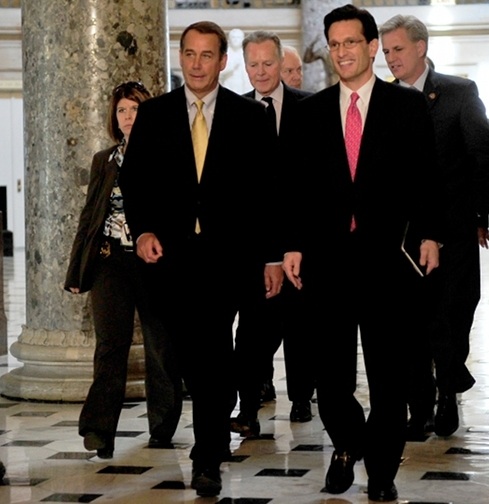Health care reform advocates are wise to the hidden middle-class taxes that passed the House last week, and are doing their best to kill them.
The groups Families USA and Center on Budget and Policy Priorities have argued publicly against the proposal, and House and Senate Democrats have circulated memos on the Hill to raise awareness of the impact the proposal will have.
As explained here, the penalties are designed to offset the cost of repealing a tax requirement on businesses. They work in several ways, but one would have particularly adverse consequences for middle-income consumers, and for the popularity of the health care law itself.
Under the House plan, if families get even modest compensation bumps after qualifying for health insurance subsidies, they can be required to reimburse the IRS with thousands of dollars. In particular, “if a family’s actual annual income [grows] even one dollar above 400 percent of poverty, the family would have to repay the entire credit,” according to a Families USA memo. “Those who live in areas where premium costs are higher and who end up with incomes slightly above 400 percent of poverty will not only have to pay back the full credit, but they will have to repay more than those with the same income and amount of credit received who live in areas where premium costs are lower. Because the premium credits protect individuals and families from having to pay more than a set percentage of income on premiums, those who live in areas where premium costs are higher will receive a larger credit and thus be required to owe more than others who live in regions with lower premium costs.”
This chart, being circulated by Dems on the Hill, breaks down just how big the impact would be on families in income brackets between 200 and 400 percent of the federal poverty level.
Here’s how CBPP describes the secondary impact.
[T]he offset would discourage many people with modest incomes from applying for subsidies in the first place and lead more of them to remain uninsured instead (and pay a modest penalty for failing to have insurance). Those who elected not to purchase coverage would predominantly be people who thought they could risk going without coverage because they are in good health. As a consequence, the pool of people who enroll in the exchanges would consist, on average, of less-healthy individuals than would otherwise be the case — which would push up premiums for policies available through the exchanges and thereby depress exchange enrollment further. The Ways and Means provision also likely would fuel backlash against the health reform law on the part of lower-middle-income families and individuals who purchased coverage and then found themselves owing large sums to the Internal Revenue Service.










